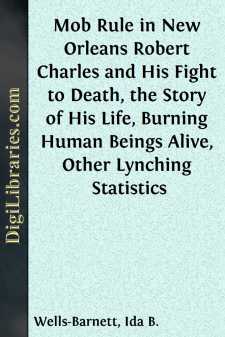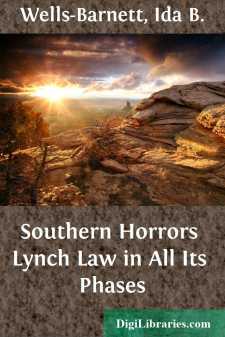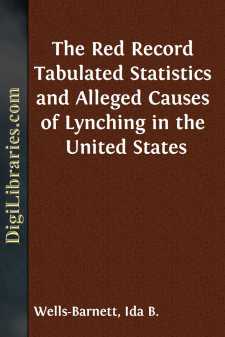Categories
- Antiques & Collectibles 13
- Architecture 36
- Art 48
- Bibles 22
- Biography & Autobiography 813
- Body, Mind & Spirit 142
- Business & Economics 28
- Children's Books 17
- Children's Fiction 14
- Computers 4
- Cooking 94
- Crafts & Hobbies 4
- Drama 346
- Education 46
- Family & Relationships 57
- Fiction 11829
- Games 19
- Gardening 17
- Health & Fitness 34
- History 1377
- House & Home 1
- Humor 147
- Juvenile Fiction 1873
- Juvenile Nonfiction 202
- Language Arts & Disciplines 88
- Law 16
- Literary Collections 686
- Literary Criticism 179
- Mathematics 13
- Medical 41
- Music 40
- Nature 179
- Non-Classifiable 1768
- Performing Arts 7
- Periodicals 1453
- Philosophy 64
- Photography 2
- Poetry 896
- Political Science 203
- Psychology 42
- Reference 154
- Religion 513
- Science 126
- Self-Help 84
- Social Science 81
- Sports & Recreation 34
- Study Aids 3
- Technology & Engineering 59
- Transportation 23
- Travel 463
- True Crime 29
Ida B. Wells-Barnett
Ida B. Wells-Barnett was a prominent African American journalist, educator, and civil rights activist in the late 19th and early 20th centuries. She is best known for her courageous work in documenting lynching in the United States through her investigative journalism and pamphlets, including "Southern Horrors" and "The Red Record." Wells-Barnett was also a founder of the National Association for the Advancement of Colored People (NAACP) and fought for women's suffrage. Her legacy continues to inspire movements for justice and equality.
Author's Books:
Sort by:
INTRODUCTION Immediately after the awful barbarism which disgraced the State of Georgia in April of last year, during which time more than a dozen colored people were put to death with unspeakable barbarity, I published a full report showing that Sam Hose, who was burned to death during that time, never committed a criminal assault, and that he killed his employer in self-defense. Since that time I...
more...
HON. FRED. DOUGLASS'S LETTER Dear Miss Wells: Let me give you thanks for your faithful paper on the lynch abomination now generally practiced against colored people in the South. There has been no word equal to it in convincing power. I have spoken, but my word is feeble in comparison. You give us what you know and testify from actual knowledge. You have dealt with the facts with cool, painstaking...
more...
THE CASE STATED The student of American sociology will find the year 1894 marked by a pronounced awakening of the public conscience to a system of anarchy and outlawry which had grown during a series of ten years to be so common, that scenes of unusual brutality failed to have any visible effect upon the humane sentiments of the people of our land. Beginning with the emancipation of the Negro, the...
more...




